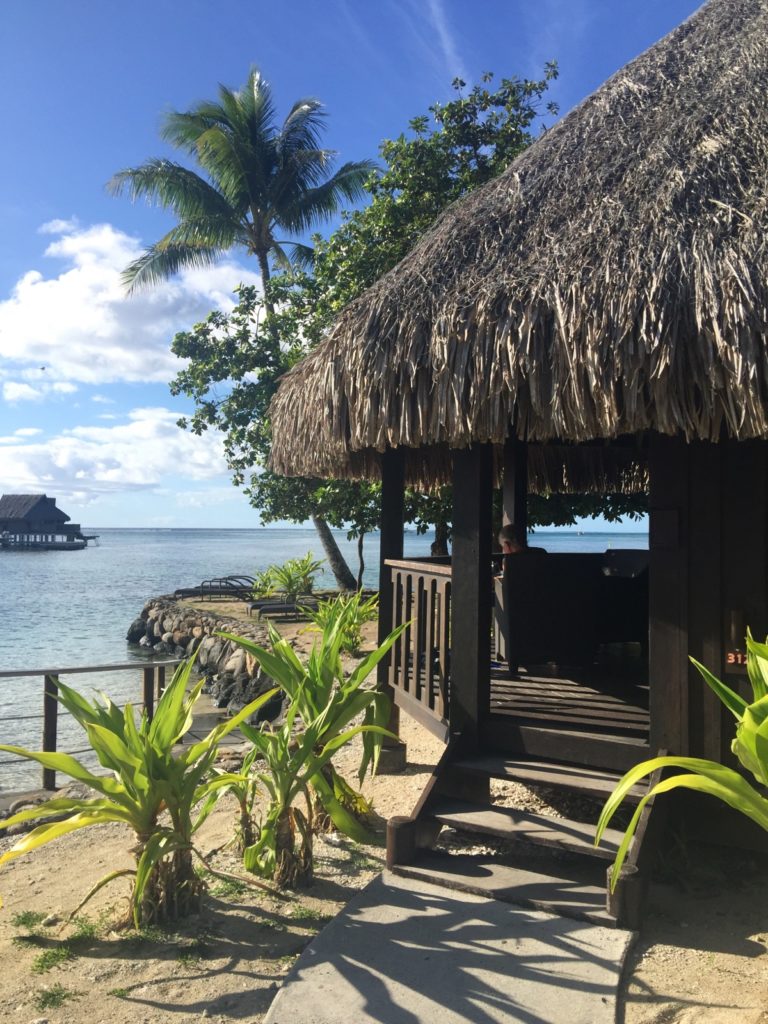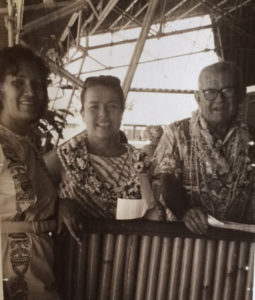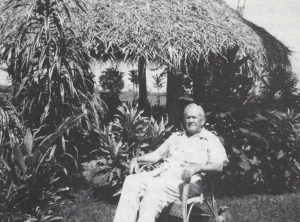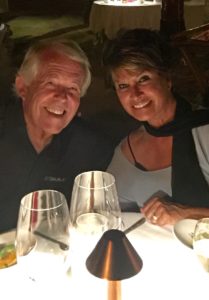
Our visit to Huahine, Moorea and Tahiti was an emotional one for me. It not only marked the end of our Double X sailing journey, but also triggered a flood of memories of my earlier trips to the islands as well as my father’s deep love for the South Seas and his efforts to protect its beauty and majesty. In the midst of this reflection, I was also keenly aware that this would probably be the last time that I sail to these lovely islands that have captivated me for most of my life.
My father’s island dream
I first became interested in French Polynesia thanks to my dad’s adventures on the islands. After reading Melville, learning of Gauguin’s paintings and seeing enticing photos, he wanted to see Tahiti for himself. This was in the mid-1950s, long before the island had an airport, so he and my mother boarded a Pan-American seaplane and off they went, landing in Papeete. They quickly fell in love with the country and the people and eventually bought a vacation home just outside of town overlooking the beautiful sea.
Meanwhile, Nutrilite was thriving with tremendous growth across the United States, earning the company a feature article in Fortune Magazine. For my father, it was a glorious period. His dreams for Nutrilite were being fulfilled, and the income allowed him to explore other ideas, including how to protect the islands and people that he had come to love.
A hotel chain with an eco-friendly mission

Dad had a dream to develop a chain of hotels across the South Pacific to cater to people who wanted to immerse themselves in the beauty of nature. It’s called eco-tourism today, but back then, it was a pioneering idea. Above all, he was adamant that his efforts would protect the environment and benefit the native cultures.
His first hotel was Les Tropiques in Tahiti. It was considered one of the finest, romantic hotels in the entire South Seas. Great writers such as Somerset Maugham would come from all over the world to experience and write about its breathtaking view of Papeete in one direction and Moorea in the other. It was a magical destination, and other hotels in American Samoa, Samoa and Fiji soon followed.
Dad wrote many articles and essays about his beloved South Seas, and I wrote about how events unfolded in The Nutrilite Story (see Learn More: Nutrilite & Amway). Sadly, problems hindered his plans, but his dream always stayed with him, which made me want to visit even more.
My first visit to Tahiti
My first visit to the islands was in 1964 after I graduated from Berkeley. With an airplane ticket in hand, I set off to travel around the world, making a total of 39 stops and finally landing in Tahiti to visit my parent’s home in Punaauia.

I have such vivid memories of that home, its reefs laden with beautiful coral and sea anemones, the abundant fish and spear fishing with the natives. It was a magnificent time, and I carried that wonderful spirit back with me when I returned to California to join the company full time.
Civilization starts taking its toll
I have been eager to return to this part of the world ever since that first visit. When I had the opportunity to make the 3-year Firebird Journey in 1975, I made sure Tahiti was one of my first stops. Back then, the people were still warm and friendly and the sea life was abundant, but civilization was closing in with hotels springing up all around. Even my father’s investment took a sad turn when the government took his property under eminent domain to make way for a massive airport.
From bad to worse
The changes that I have seen since my first visit back in 1960s are nothing short of immense. Today’s islands are still beautiful, and the people are still incredibly friendly, but dramatic changes in the environment are quite clear. Population growth has lead to an increase in pollution. The sea life around Tahiti has been depleted. Coral reefs that I visited in the 1960s are gone while others have been polluted and destroyed. Today, you need to go to the outer islands and outer parts of Tahiti to see a healthy reef. Even there, invasive algae, which grow in the warmer, more acidic waters, are attacking and weakening the reefs.
The islanders know all too well the challenges they face. They understand that they must live in a sustainable way if they are to protect their land and sea life for future generations. It’s an awareness that I hope gains momentum around the world because we need to tackle these challenges at a high level—university research, government involvement, business partnerships—if we are to protect not only the islands, but the planet as a whole.
The more we know
We’ll never know just how different the islands would be today if my father’s efforts had been more successful. I often wonder about that. But what is abundantly clear to me, especially after seeing so many changes firsthand, is that we need to ramp up our efforts to protect the land for future generations. I think the best approach is a three-step one that targets knowledge, support and action.
Becoming more knowledgeable, more aware, is the first step. This is no easy task, especially with the hectic pace of today’s life, but good resources are available like The Sixth Extinction: An Unnatural History by Elizabeth Kolbert (see Learn More: Healthy Planet). This is a compelling view of the challenges our planet has faced in the past and currently faces today.
Next, I believe it is important that we join others and work together on making a difference. Finally, we need to take action, starting with small sustainable changes, every day, in our corner of the world, which can ultimately reap large rewards and help protect our planet for generations to come.
A win-win for people and the planet

One of the best examples of living sustainably is the farms where we grow plants for Nutrilite products. I love to take people here so they can see firsthand how our experts practice sustainable organic practices and how the land becomes more fertile, more productive and more resilient with each year. It’s a definite win-win, not only for people, but for the planet.
Do I have all the answers? No way. I sincerely believe that the answers will come from people who take an interest in these areas, who become versed and knowledgeable in them, and then look for ways to improve the world in which we live. The answers come from all of us.
Time to look forward
This has been an incredible sailing journey. Not only have I been able to return to the islands and people that I so love, but I have been able to share our adventures and observations along the way in the hopes of raising awareness.
Now, I look forward to doing all that I can to help the islanders and others around the world embrace a sustainable, healthy lifestyle for themselves, their families, their communities and ultimately the planet.
Wishing you and your loved ones a very happy and healthy holiday season.
Cheers,
![]()
P.S. Don’t forget you can subscribe to our RSS feed to have blog posts delivered right to your inbox.
P.S.S. Don’t forget to check out our photos from the South Pacific from 40-plus years ago (Firebird Albums) and recently (Photo Album 10: Society Islands). I hope you enjoy!

Mission accomplished, Sam. You’ve made all of us more aware of a part of the world we assumed was still largely unblemished by “progress.” More important, you’ve no doubt persuaded some of us to become involved in efforts supporting your views on a healthy and sustainable planet. Personally, to endangered polar bears, wolves and elephants, I’ve added coral reefs and fisheries. Thanks to you and Francesca for sharing your grand adventure. It was fascinating, and important.
Sam,
A wonderful description of the condition of a vital part of our globe and your father’s prescience. I’ve told you of my memories of meeting him during the waning days of the Second World War. He was a very impressive man, especially to a kid who had seen all the current war movies and thought he was Spencer Tracy. The resemblance was almost as uncanny as Francesca’s to Sophia Loren.
Peter
Dr. Sam, I remember a speech you gave after the astronauts first touched down on the moon. You showed their picture of the earth on the screen and pronounced that we need to take steps to protect this earth because “this is all we have.” I will never forget that! I am not sure that what I do will mean much, but I truly believe you are right. You are, and always have been, one thoughtful dude. May God bless you and Francesca.
Loving all of this, Sam!! I, too, have witnessed, firsthand, the overpopulation and devastation of once pristine waters and lands. I feel it is our duty to educate current generations of the great, environmental losses theirs and future generations will experience, if we don’t re-evaluate Earth in the sense of an environmentally protected and resource nurtured planet!
Your observations are both erudite and valuable to our planet, Sam. Thank you for sharing BOTH of your wonderful journeys! I have thoroughly enjoyed your “conversations” and experiences via your blog.
All of My Love and Many Hugs Until We Meet Again!
Linda Christine (Haas/White) Adams